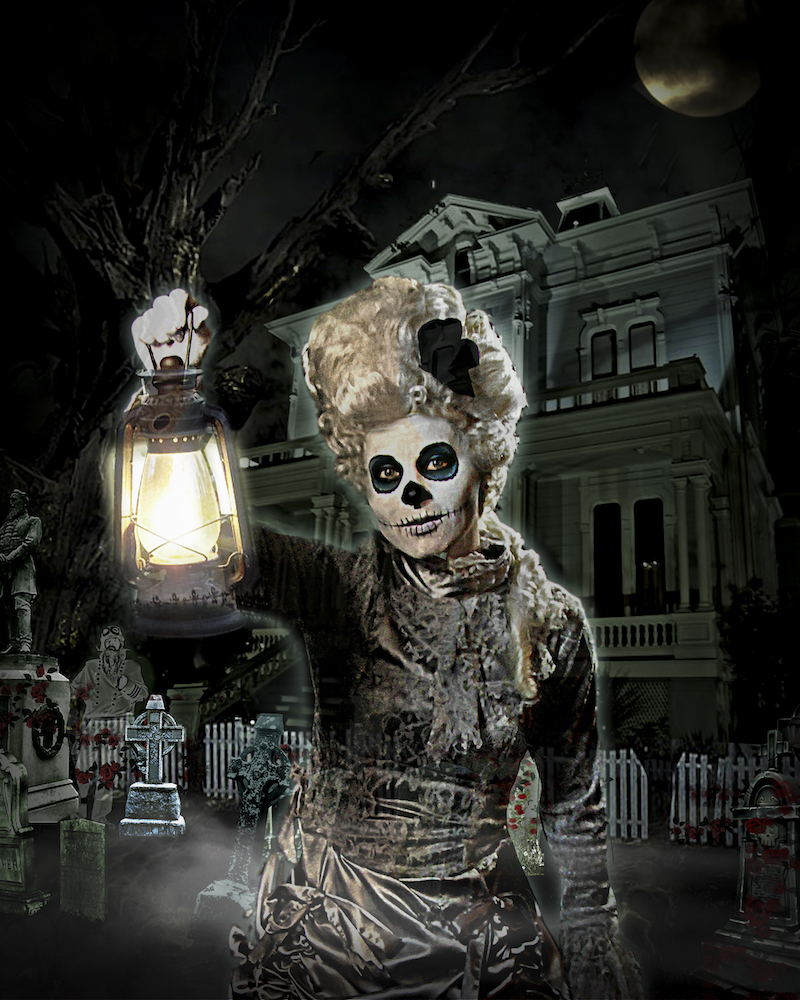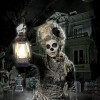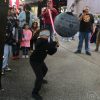ORA LOUISE
By Raylene Evans
Photo Image Michael J Mangano
The McHenry Mansion was built in 1883 by Robert and Matilda McHenry. It sits at the corner of Fifteenth and I Streets in Modesto. By 1901 they had both passed from this world and their son moved his family into the house. While down south with her mother, daughter Ora Louise was involved in a fire and died. Nowadays, busloads of third graders come for tours as part of their history lessons. They invariably want to know about the ghosts. Here’s what I know:
The Modesto Police Officer placed the tape recorder on the table next to my hospital bed and pressed the record button. He gave my name, today’s date, stated we were at Doctors Hospital, and then said, “Start from the beginning.”
He was about six feet tall, chocolate brown skin, stocky, and smelled of starch and leather. The other officer, a woman probably in her mid-thirties with dark hair pulled back on her neck, leaned forward in the chair next to my bed, pen and pad in hand.
I closed my eyes and tried to remember it all. It was important they knew everything.
“I gave several tours of the McHenry Mansion yesterday, but just before four I remembered that I still had to find the lawn signs for this weekend’s docent functions.”
The lady officer knocked her pen on the bed rails to get my attention. “What’s a docent?”
“A volunteer. There’s about a hundred of us. We give tours and that sort of thing.” I winced in pain and tried to reach my wrist with my free hand but could not.
The officer wrote something on her notepad, then smiled and got up to put the handcuff on a lower rung of my bed’s side bars. “That better?”
I smiled back, “Thank you,” then closed my eyes again.
“Like I said, I had to find the lawn signs for this weekend, so I went to the basement of the mansion and checked the small closet by the elevator. The signs were there alright, but I had to move some boxes to get to them. The first box I took out was so full of papers that some spilled out when I moved it.”
“And then what happened?” Asked the lady officer.
“Well, I picked up the papers and saw that they were mostly from parents and teachers. Some were written by students and a few were from the city. I took a quick look and read that the City of Modesto was repeatedly disclaiming any responsibility for the missing third grade students. I couldn’t believe what I found.” Both officers had their heads down, taking notes.
“City workers were cleaning the basement so I carried the box up to the main floor and found workmen dismantling a light fixture. I decided to go to the second floor where I could be alone to read about the missing children. I got about halfway up the stairs when I remembered the sign I’d seen. I dug it out of the box and measured the rope it was hanging from. It was just the right size to block the front staircase. The simple sign said, ‘THIRD GRADERS BEYOND THIS POINT MAY NOT RETURN’. I threw it in the box and ran upstairs, darting across the hall into a bedroom, and sat cross legged on the floor next to the portal of the sitting room. No one would bother me there.”
“I read as many letters and reports as I could, until twilight. For at least three decades third graders have gone missing from the house, only to show up in their own beds after a number of weeks. The City knows about it. The schools know. The head of our Merry Maids committee as well as our docent historian know about it. I read copies of their replies to the teachers and parents who desperately wanted their children back. It seems this matter is extensively being covered up.”
“Whoosh! Something flew past me, then another just like it. I heard giggling as two more specters came through the wall beside the big brass bed, past me, and into the hall. Scared and anxious, I sat straight up with my back firmly against the closet door.”
The policeman left his chair to stand in the doorway. A nurse turned her back to my room and whispered something to him. He said, “OK,” then came back to sit in his chair. “Go on.”
“The whooshing of apparitions, as it turns out, were children playing. Playing as hard as they could. They were chasing each other, racing, laughing and taking shortcuts, appearing through walls and vanishing into ceilings and sometimes one or two would pop up through the floor. I’d be scared if it wasn’t so much fun to watch. It was then that a little girl, about ten and wearing white satin, quietly sat beside me. I petted her hand as it rested on my arm. ‘You’re Ora Louise, aren’t you?’ She nodded in agreement. ‘You’ve been playing with the third graders, haven’t you?’ She nodded again and I followed her eyes to the Victorian couple who appeared before us. They looked just like the McHenry photographs in the reception room. The little girl leapt up and gave them each a quick hug, then laughed and disappeared through a wall.
‘I see you’ve met our granddaughter,’ Robert said.
‘Matilda and Robert McHenry,’ I said, rising to my feet. ‘I’m so pleased to meet you both.’ Matilda gave a warm smile and hovered between us for a moment, then, with her feet almost touching the floor, she disappeared from view.
Robert said, ‘You have questions for me, don’t you.’
I hesitated before asking the obvious, ‘Why are there ghosts in the house?’
‘We’ve been here since it was built,’ he said. ‘We have no reason to leave. Ora Louise was in this house for only a short time, but she knew the spirit of our love when she was here. After the fire, when she stepped out of earthly existence, she returned to us.’
Somehow that made sense. ‘What’s with the third graders?’
‘Ora Louise needs children to play with her,’ Robert said. ‘Younger children see her scars from the fire and are afraid. Some of the older children make fun of her. We can’t have that.’
‘I’m confused, Robert. I didn’t see any scars.’
Robert smiled knowingly. ‘You must be a grandmother. Grandmothers don’t notice a child’s scars.’
I stepped back so a tangle of youngsters could go around me instead of through me. ‘But why does she always need more third graders? Doesn’t she have enough?’
‘Actually,’ he said, ‘she only has a few. You see how hard they play? We send them home before they wear themselves out, but we do need to replace them. We got a new one last week when a school tour came through, and we’ll probably need another one in a few days.’
The lady police officer released the handcuff from my wrist and helped me stand up next to the bed. It felt good to stretch.
“We talked all night long. That’s why I was in the house this morning. I wish I had a recording of the fun they’re having. There’s giggling, roars of laughter, they’re calling out from both ends of the hall. There’s jacks being played, and marbles and checkers. Everyone’s having a grand time.”
Several attendants helped me put on their white cotton hospital jacket, then crossed my arms in front of me and tied the long sleeves behind my back.
“It’s time to go,” the lady officer said. “Your ride is here.”
End.
Ratline Evans – RayleneEvans@att.net










